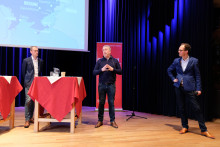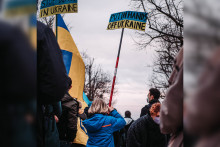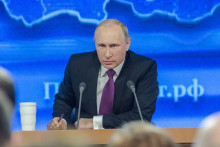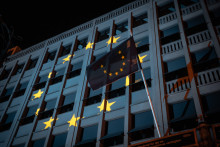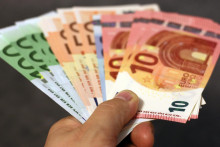Presenters Jelle Posthuma (U-Today) and Peter Timmerman (Studium Generale) briefly introduced Donnelly to the audience and shared some recent facts, after which the Canadian quickly took over. Donnelly went into detail about what the European sanctions mean for Russia. ‘In any case, they will not lead to a ceasefire or peace in the short term. Do consider that the war only takes place in Ukraine. Russia has an army of 900,000 soldiers. Economic sanctions only work in the medium to long term’, Donnelly stresses. Also: ‘Don’t forget that Europe is still funding the Russian war machine. Germany pays Russia 3.5 billion euros a month for gas. Moreover, Russia does not import, but it does export, so it is basically getting richer.’
Angela Merkel
At a lecture on the 36-day war, you expect an expert to focus in on the key players: Ukraine and Russia. Donnelly, however, highlighted Germany’s role in almost all of his answers. ‘The country is now making plans in case Russia actually turns off the gas tap. That is good, but it should have happened much sooner. Russia invaded Crimea in 2014, but Angela Merkel rewarded Russia for that by continuing to transfer billions to Vladimir Putin every year.’
Incidentally, Donnelly does not rule out Russia actually turning off the gas tap to the West. ‘Why not? It’s war after all. Compare it with the use of chemical weapons. Many people didn’t think that was possible either. You have to keep looking back how Russia acted in the past. If they did something then, like in Afghanistan or Vietnam, why not now?’
Shower mat
From the Amphitheater – where several dozen interested people were present – questions and ideas about a possible way out of the war passed by too. For example, what would happen if Putin slipped in the shower and died? Donnelly: ‘Then you judge where his successor’s origin. Probably the KGB (Russian secret service, ed.) and then the question is whether much will change. By the way, Putin does not slip easily in the shower. If you look at his spending habits, then I'm sure no shower mat is missing from his bathroom.’
Another question from the audience was whether and how the scientific world can play a role in the situation in Ukraine. According to the lecturer, this is mainly in keeping an overview and making the right choices. ‘Scientists are good at thinking in multiple options. The danger is that you put too much money into defense, as Russia does. The quality of life has dropped tremendously as a result. Russia has about 140 million inhabitants, it is estimated that almost a million Russians died from Covid. That says a lot about how their health care is doing. Russia had a chance to modernize after the Cold War, but it missed the opportunity because all the money was pumped into defense. The economy of the largest country in the world is no bigger than Italy’s. Europe’s science can help make up for that by coming up with good choices.’


